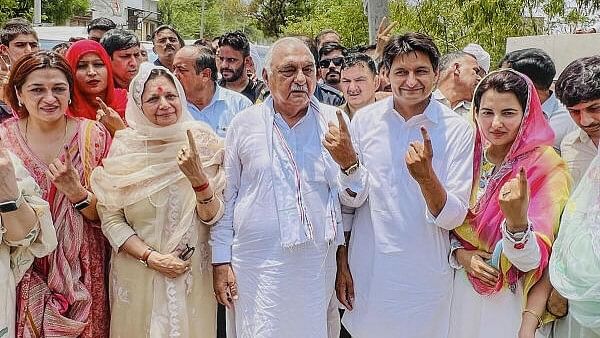
Congress leaders Bhupinder Singh Hooda and Deepender Singh Hooda after casting their votes at a polling booth during the sixth phase of Lok Sabha elections.
Credit: PTI Photo
The Congress has yet again faltered in Haryana as voters handed over a third consecutive term and a historic victory to the Bharatiya Janata Party (BJP) that rode to power mainly on the Jats versus non-Jats factor despite facing severe anti-incumbency of 10 years against its government.
The setback in Haryana reminds one of the Congress’ debacle in Madhya Pradesh and Chhattisgarh in the 2023 Assembly polls when pollsters projected a BJP defeat. However, the saffron party ended up winning both the states and Rajasthan as well.
The Congress has failed to make a mark in North India, and also displayed its ability to beat the BJP in states where the two are directly pitted against each other.
In Haryana, the projection of a Jat face as CM — though not officially declared — by the Congress had visibly antagonised the other castes.
In the end, the elections narrowed down to 35 communities versus one as non-Jat voters ignored the anti-incumbency factor to prevent Haryana from witnessing yet another period of Jat domination, especially after the 2016 violent agitation by the Jats seeking inclusion in the Other Backward Class (OBC) category.
The Congress was run by former chief minister Bhupinder Singh Hooda and his son Deepender Hooda through their proxy Udai Bhan. Other senior leaders such as Kumari Selja and Randeep Singh Surjewala were sidelined.
Right from the campaigning period till the polling day on October 5, only the Jats, comprising a large number of farmers and wrestlers, were vocal against the BJP, while others preferred to remain silent. The Jats account for 27 per cent of Haryana's estimated 31 million population and 73 per cent are non-Jats. Though the Hoodas managed to retain their Jat base, they failed to garner support from other communities.
In 58 years of Haryana's existence, the Jats have headed the state government for 33 years while non-Jats steered it for 25 years.
It was the BJP that brought an end to the Jat dominance in 2014. The saffron party had risen from being a marginal force that was dependent on the mercy of others to ruling Haryana. It had clearly managed to change the political dynamics in the state.
The Congress leadership failed to assess the ground situation and surrendered before Hoodas at the cost of leaders of other castes such as Kumari Selja.
When it came to ticket distribution, the Hooda camp bagged 72 tickets while the remainder were shared by Selja and others. The move angered Selja to such an extent that she stopped campaigning for the Congress. During that period, there was intense speculation that she might join the BJP. This wasn't without a reason.
Former Haryana chief minister Manohar Lal Khattar openly offered her to join the BJP given that the Congress had sidelined and insulted her. However, Selja declined all such offers and decided to stay put in the Congress.
The takeover of the Haryana Congress by the Hoodas had triggered infighting in the state unit as leaders started working in different directions, damaging the party's electoral prospects.
The script in Haryana for the Congress was like the one that played in Madhya Pradesh and Chhattisgarh. The overreliance on the Hoodas in Haryana, Kamal Nath in Madhya Pradesh, and Bhupesh Baghel in Chhattisgarh cost the Congress heavily in these three states despite having a fair chance to win the elections.
For Rahul Gandhi too, this defeat has dented his image, which has been on an upswing after his nationwide Bharat Jodo Yatra in 2022-2023.
His campaigning on the points that the BJP had launched an all-out assault on the Constitution, farmer's issues, atrocities on the Dalits, unemployment, and the Agniveer scheme, seemingly resonated on the ground only with the Jats, and thus failed to pay electoral dividends to the Congress.
The setback in Haryana and its poor show in Jammu & Kashmir could have an impact on the Congress’ performance in the upcoming Assembly elections in Maharashtra and Jharkhand.
The Congress has lost the bargaining power in these two states where the grand old party will be fighting the Assembly elections in alliance with regional parties — the Shiv Sena (Uddhav Thackeray) and the Nationalist Congress Party (Sharad Pawar) in Maharashtra, and the Jharkhand Mukti Morcha (JMM) in Jharkhand.
To ensure it doesn't lose further ground, the Congress needs to put its house in order on an immediate basis, otherwise it risks the chances of facing a Haryana-like situation in other states too.
(Aurangzeb Naqshbandi is a senior journalist who has been covering the Congress for 15 years, and is currently associated with Pixstory.)
Haryana Assembly poll 2024 results| Check constituency results here
J&K Assembly poll 2024 results| Check constituency results here
Assembly Elections 2024 | In the first assembly polls since the Lok Sabha elections, Narendra Modi and the BJP face a rejuvenated and vindicated Opposition in the Haryana assembly polls. Meanwhile, Jammu and Kashmir is voting after almost a decade and it remains to be seen how the abrogation of Article 370 has impacted the political landscape of the Valley. Check live updates and track the latest coverage, live news, in-depth opinions, and analyses only on Deccan Herald.
Subscribe and follow DH on Whatsapp, X, Facebook, YouTube, and Instagram to never miss out on anything.